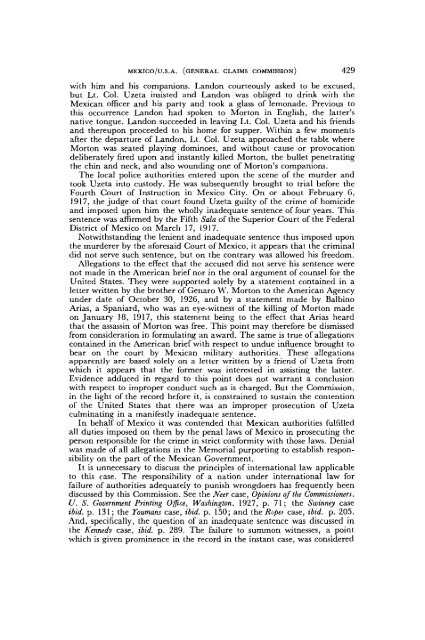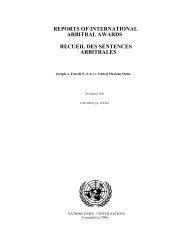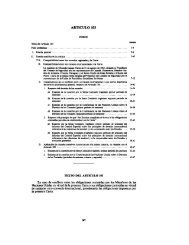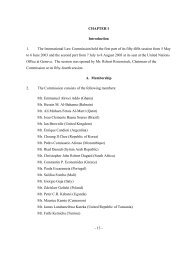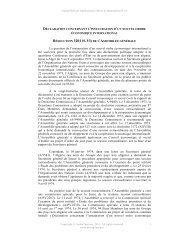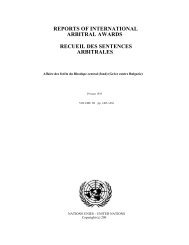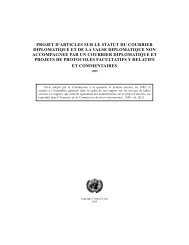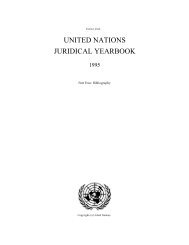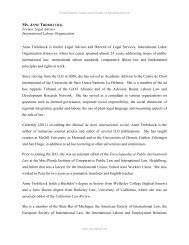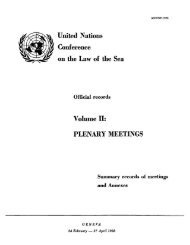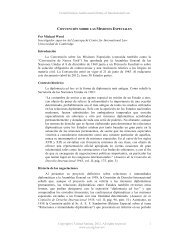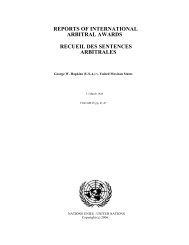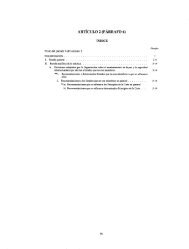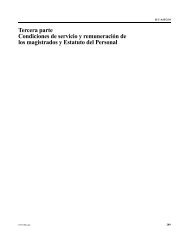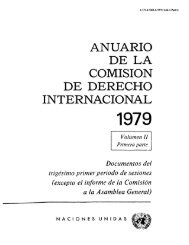428-435 - United Nations Treaty Collection
428-435 - United Nations Treaty Collection
428-435 - United Nations Treaty Collection
Create successful ePaper yourself
Turn your PDF publications into a flip-book with our unique Google optimized e-Paper software.
MEXICO/U.S.A. (GENERAL CLAIMS COMMISSION) 429<br />
with him and his companions. Landon courteously asked to be excused,<br />
but Lt. Col. Uzeta insisted and Landon was obliged to drink with the<br />
Mexican officer and his party and took a glass of lemonade. Previous to<br />
this occurrence Landon had spoken to Morton in English, the latter's<br />
native tongue. Landon succeeded in leaving Lt. Col. Uzeta and his friends<br />
and thereupon proceeded to his home for supper. Within a few moments<br />
after the departure of Landon, Lt. Col. Uzeta approached the table where<br />
Morton was seated playing dominoes, and without cause or provocation<br />
deliberately fired upon and instantly killed Morton, the bullet penetrating<br />
the chin and neck, and also wounding one of Morton's companions.<br />
The local police authorities entered upon the scene of the murder and<br />
took Uzeta into custody. He was subsequently brought to trial before the<br />
Fourth Court of Instruction in Mexico City. On or about February 6,<br />
1917, the judge of that court found Uzeta guilty of the crime of homicide<br />
and imposed upon him the wholly inadequate sentence of four years. This<br />
sentence was affirmed by the Fifth Sala of the Superior Court of the Federal<br />
District of Mexico on March 17, 1917.<br />
Notwithstanding the lenient and inadequate sentence thus imposed upon<br />
the murderer by the aforesaid Court of Mexico, it appears that the criminal<br />
did not serve such sentence, but on the contrary was allowed his freedom.<br />
Allegations to the effect that the accused did not serve his sentence were<br />
not made in the American brief nor in the oral argument of counsel for the<br />
<strong>United</strong> States. They were supported solely by a statement contained in a<br />
letter written by the brother of Genaro W. Morton to the Ameiican Agency<br />
under date of October 30, 1926, and by a statement made by Balbino<br />
Arias, a Spaniard, who was an eye-witness of the killing of Morton made<br />
on January 18, 1917, this statement being to the effect that Arias heard<br />
that the assassin of Morton was free. This point may therefore be dismissed<br />
from consideration in formulating an award. The same is true of allegations<br />
contained in the American brief with respect to undue influence brought to<br />
bear on the court by Mexican military authorities. These allegations<br />
apparently are based solely on a letter written by a friend of Uzeta from<br />
which it appears that the former was interested in assisting the latter.<br />
Evidence adduced in regard to this point does not warrant a conclusion<br />
with respect to improper conduct such as is charged. But the Commission,<br />
in the light of the record before it, is constrained to sustain the contention<br />
of the <strong>United</strong> States that there was an improper prosecution of Uzeta<br />
culminating in a manifestly inadequate sentence.<br />
In behalf of Mexico it was contended that Mexican authorities fulfilled<br />
all duties imposed on them by the penal laws of Mexico in prosecuting the<br />
person responsible for the crime in strict conformity with those laws. Denial<br />
was made of all allegations in the Memorial purporting to establish responsibility<br />
on the part of the Mexican Government.<br />
It is unnecessary to discuss the principles of international law applicable<br />
to this case. The responsibility of a nation under international law for<br />
failure of authorities adequately to punish wrongdoers has frequently been<br />
discussed by this Commission. See the Neer case, Opinions of the Commissioners,<br />
U. S. Government Printing Office, Washington, 1927, p. 71; the Swinney case<br />
ibid. p. 131 ; the Tournons case, ibid. p. 150; and the Ropei case, ibid. p. 205.<br />
And, specifically, the question of an inadequate sentence was discussed in<br />
the Kennedy case, ibid. p. 289. The failure to summon witnesses, a point<br />
which is given prominence in the record in the instant case, was considered


